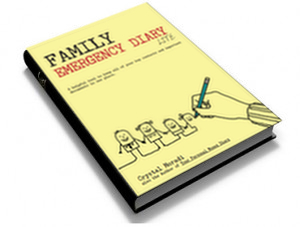 The Family Emergency Diary is designed to assist you in keeping all of your key contacts and important documents listed in one place. Whether you have an emergency or if it’s tax season, you will be able to quickly locate the information you need. So if you have forgotten what types of accounts or policies you hold, this diary will point you in the right direction. In addition to assisting you with your needs, the diary will also guide your loved ones when they have to find your financial and insurance documents. The diary will give you and your family peace of mind and relieve some of their stress during a difficult time. Keeping your finances and personal documents organized can be easier with the Family Emergency Diary, and we hope you will put this booklet to good use.
The Family Emergency Diary is designed to assist you in keeping all of your key contacts and important documents listed in one place. Whether you have an emergency or if it’s tax season, you will be able to quickly locate the information you need. So if you have forgotten what types of accounts or policies you hold, this diary will point you in the right direction. In addition to assisting you with your needs, the diary will also guide your loved ones when they have to find your financial and insurance documents. The diary will give you and your family peace of mind and relieve some of their stress during a difficult time. Keeping your finances and personal documents organized can be easier with the Family Emergency Diary, and we hope you will put this booklet to good use.
Top 10 Emergency Document Tips
- Make sure that all your important paperwork can be found in one container. Once all the paperwork is put into one container, it is much easier to take it along with you in case of emergency.
- Plan to make duplicate copies of all important paperwork as a backup. You can then use separate containers for each duplicate set of paperwork. This way, you’ll have multiple copies of your paperwork in case one set is lost or damaged.
- Remember to keep all your documents dry by using containers that are waterproof to prevent water damage and mildew.
- Protect your documents from unwanted eyes by putting a lock or some other security device on the container.
- Label and organize all the documents you have within the container either alphabetically or in some other method that is easiest for you.
- Try to keep the box lighter than 50 pounds so it can be easily carried and moved when needed.
- To help reduce the weight, store appropriate paperwork as files on a CD or DVD. Make sure to password-protect them so no one can see these files without your permission.
- Consider storing some of your documents, such as birth certificates, death certificates,marriage certificates, passports, etc. in a safety deposit box.
- Consider keeping one of your document containers in a self-storage facility.
- Keep all bills and statements for at least 1 year before throwing them away. You’ll be ready to give proof of purchases or transactions in case that information is needed from you.

